Comfort Read online
Comfort
ALSO BY ANN HOOD
FICTION
Somewhere Off the Coast of Maine
Waiting to Vanish
Three-Legged Horse
Something Blue
Places to Stay the Night
The Properties of Water
Ruby
An Ornithologist’s Guide to Life: Stories
The Knitting Circle
MEMOIR
Do Not Go Gentle
Comfort
A JOURNEY THROUGH GRIEF
Ann Hood
W. W. Norton & Company
New York • London
Excerpt from “Wage Peace” by Judyth Hill. Copyright © 2001 by Judyth Hill. Used with permission.
Copyright © 2008 by Ann Hood
All rights reserved
First Edition
For information about permission to reproduce selections from this book, write to Permissions, W. W. Norton & Company, Inc., 500 Fifth
Avenue, New York, NY 10110
Production manager: Anna Oler
Library of Congress Cataloging-in-Publication Data
Hood, Ann, 1956–
Comfort: a journey through grief/Ann Hood.—1st ed.
p. cm.
ISBN: 978-0-393-06864-1
1. Grief. 2. Bereavement—Psychological aspects. 3. Loss (Psychology) 4. Children—Death—Psychological aspects. 5. Consolation. I. Title.
BF575.G7H658 2008
155.9'37092—dc22 2008001310
W. W. Norton & Company, Inc.
500 Fifth Avenue, NEw York, N.Y. 10110
www.wwnorton.com
W. W. Norton & Company Ltd.
Castle House, 75/76 Wells Street, London W1T 3QT
For my family
Lorne, Sam, Annabelle, Ariane,
and Grace
Contents
PROLOGUE: Comfort
CHAPTER ONE: Losing Grace
CHAPTER TWO: Knitting Lessons
CHAPTER THREE: Comfort Food
CHAPTER FOUR: Now I Need a Place to Hide Away
CHAPTER FIVE: Wildfires
CHAPTER SIX: Hold Me
CHAPTER SEVEN: Staying
CHAPTER EIGHT: Hello, God! It’s Me, Ann
CHAPTER NINE: There
CHAPTER TEN: Annabelle’s Laughter
EPILOGUE: Today
acknowledgments
PROLOGUE
Comfort
TIME HEALS.
She is in a better place.
She is still with you.
You should walk every day; you should write this down; you should go to church, to therapy, to the cemetery; these things will help you.
There is a heaven and you will see her again there.
You are not dreaming about her because you are closed to possibility.
Time heals. Once you have lived through all the firsts, it will get better. The first summer at the beach without her elaborate sandcastles; the first day of school, when she would have put on her purple leopard backpack with her collection of key chains—a starfish, miniature Lincoln Logs, the butterfly from Japan—and walked into first grade; her sixth birthday and her customary costume/painting/tea party birthday party; the first Halloween without her dressing as something with wings: an angel, a fairy, a ladybug; the first Thanksgiving when her face does not appear among the thirty others eating two twenty-three pound turkeys in our dining room; the first Christmas that I do not have to hide art supplies in the closet in my study, the bags bulging with glitter markers and crayons and sketch pads and modeling clay and watercolors and fat paintbrushes and gel pens and rolls and rolls of stickers of smiley faces and daisies and puppies and stars; the first Valentine’s Day that she does not cut out construction-paper hearts and string them together for me; the first Easter without an Easter egg hunt or a pink basket filled with Smarties and Sweet Tarts and Peeps, the purple ones; the first anniversary of losing her, when the peonies are blooming in our garden and the air is filled with promise. After you have survived all of those things, it will get easier to live without her.
Are you writing down how you feel? But I cannot write. I cannot think of anything except her, the way she looked splashing in the bathtub, the way she wiggled her toes against mine, the feel of her sticky hand holding on to my hand good and tight. Write that down! It will help!
The images of those hours in the hospital, of the doctor’s face telling you Grace was not going to make it, the rushing of nurses’ feet with vials of her blood, the voice on the intercom announcing that Grace was in cardiac arrest, the way they made you wait outside the room, your face pressed against glass, the sounds of your screams, all of this will fade.
She is with you. She is a rainbow in the sky. She is the butterfly in your garden. She is the cardinal in the mimosa tree. But I have called out her name to each of these things and they simply fade away. That is because you don’t believe.
You cannot stay in bed every day and watch Sex and the City on DVD. You need to get outside. You need to walk.
You will sleep again, an entire night through. It is when I sleep that I am back in that hospital. My own screams wake me.
Take Benedryl, Ambien, Xanax, Zoloft, Prozac, Dr. Bach’s Rescue Remedy, smoke pot, drink white wine, warm milk, single malt scotch.
Go to grief groups and listen to other parents tell how they lost their children. Then you will know you are not alone. But when I listen to how children are dying, on go carts and in fires and with guns and falling out windows and from mistakes in hospitals, I only feel more despair. Then you do not want to help yourself. These people can help you but you won’t let them.
God loves you. If there is a God, why would He have to take my Gracie Belle from me? Why would He do this? God only gives us what we can bear. But I cannot bear this. Yes you can. You are not trying hard enough.
She is in a better place. How can a five-year-old little girl be in a better place without her mother? Heaven is better than here. But she is all alone. I am all alone.
Are you writing anything down?
Here is a book by a rabbi who lost his son; by two women who both lost children and they have written their stories; by C. S. Lewis, who lost his wife and was Catholic and wise; by a psychiatrist, a sociologist, a teacher; by someone who has interviewed parents who lost children. But none of them lost Grace. They do not know what it is to lose Grace.
You need to get out of bed; off that sofa; out of the house. The world is full of five-year-old girls. They are everywhere I go. The supermarket is full of cucumbers and blueberries and pasta. Target is full of pink dresses and purple shoes and things that sparkle and glitter and shine; the drugstore only seems to sell nail polish and hair ornaments. Out in the world there are only five-year-old girls holding their mothers’ hands wherever I go.
You should walk every day.
Aren’t you feeling better? You got through a year of firsts! I did not go to the beach this summer. I did not park in my usual place at the school so I could avoid watching the first graders filing outside through the playground at the end of the day. On her birthday I sat outside beside her toy log cabin and ate cucumbers and pasta and drank too much rosé and tried not to think about the feel of her in my arms the night she was born or how her skin was the color of apricots, while my husband talked to her best friend Adrian Roop and his mother in the dining room. I did not know what to do with her Christmas stocking, the one with the angel on it and her name sewn in my crooked attempt to use a needle and thread. I did not know how to celebrate a New Year without her. And on the first anniversary of her death, I ran away with my husband and son to Cape Cod and climbed the dunes there and felt the spring sunshine on my face as if these things could make me feel better.
You look better!
Y
ou sound like yourself again.
Grace is sending you white feathers, heart-shaped stones, pennies from heaven.
Have you been writing this down?
I can’t believe that after over a year you are still not going out more. You should be walking, taking Pilates, joining a gym. My body cannot move. I am paralyzed.
Here is a book about Holocaust survivors.
Did you know Winston Churchill, Abraham Lincoln, Mark Twain all lost children? And look at what they accomplished! Then I am not as strong as they were. Grief is bigger than I am.
Time heals.
Grace would not like you to be this way. How do you know what Grace would like? I believe she would want me to miss her with every cell in my body. And that is how much I ache for her. My arms hurt from not holding her on my lap. My nose aches from not smelling her little-girl sweat and powder and lavender-lotion smell. My eyes sting from not seeing her twirl in ballet class. My ears strain every morning for her calling “Mama!” when she wakes up. My lips reach for her sticky kisses. At night I search for her.
You need to give her clothes to unfortunate children. Even her sparkly red shoes? Her pink skirt? Her lei made of paper flowers? Her leopard rain boots? Her two-pointed brightly striped pom-pom hat? It is not healthy to keep a shrine. But there are shrines to lesser things. To Jim Morrison. To pets. To saints who are no longer even considered saints. But you need to move on.
Are you writing down any of this? Only the lies people tell me. There are no words for the size of this grief. There are only lies.
You will see. Time heals.
In time you will sleep again and dream of beautiful things.
In time you will not miss her.
You will see.
Time heals.
Comfort
CHAPTER ONE
Losing Grace
HOW I GOT to this point, how we all did—Lorne and Sam and me—began three years earlier, on April 18, 2002. There is no hyperbole intended when I say that was the worst day of my life.
Had you asked me the day before, I would have told you that I was one of the happiest people I knew. At night, I would flop onto our oversized leopard beanbag chair with my eight-year-old son Sam and five-year-old daughter Grace and read. Then they would climb into Sam’s bunk beds, Sam on top, Grace on the bottom, and we sang Beatles songs until they fell asleep.
That is what we did one warm April night. Earlier, we had our first cookout of the year: barbecued chicken, baked beans, and corn. Sam basted the chicken while Grace dusted off our backyard furniture. She picked the purple myrtle and long green chives that grew in our backyard and made a bouquet for me. We sat in the yard, the four of us, until dusk. Then it was pajamas, the beanbag chair, and stories, a few rounds of “Eight Days a Week.” Grace always got into bed with her glasses still on, and that night, as I had so many other nights, I slipped them from her still small face and said: “May I take these? Or do you need them to see your dreams?”
Forty-eight hours later, Grace was dead.
WE NAMED HER Grace three years before she was born, when I found out I was pregnant the first time, with Sam. That afternoon, driving down a winding back road in Vermont, Lorne and I decided that if we had a boy he would be Sam; a girl would be Grace. That Christmas, Lorne made an ornament for our tree that read: Sam/Grace. When I was pregnant the second time, without discussion, we knew this would be Grace.
Unlike her brother, who arrived screaming and purple, Grace was born to our favorite Simon and Garfunkel CD, quiet and calm, her skin the color of apricots. “I was your apricot and Sam was your boysenberry,” she liked to say, not without smugness. Unlike her brother, she loved to sleep, taking long, cozy naps twice a day, and eager for her crib and her stuffed dog Biff early every night. Just before she fell asleep, she would lift her arms and tuck them behind her head, as if she were lying on a chaise in the warm sun.
Grace Kelly. Grace Jones. Gracie Burns. Grace Paley. Amazing Grace. It was the name of a princess, of a rock star, of a comedienne, of a writer. It was a name that inspired awe. Our Grace could be any of these things. She could be all of these things. From the minute she was born, I knew she would be.
ON APRIL 16, 2002, our son Sam turned nine years old. Lorne picked him up to take him for a “guy’s afternoon”; I took Grace to her ballet class and then hurried to the local Ben & Jerry’s to get Sam’s birthday cake. Just that day, on the way to class, Grace told me she didn’t want to do ballet in the fall, but instead wanted to take acting classes with the children’s theater ensemble as Sam had done. And, she told me, she wanted to keep studying art with Don. Grace loved art most of all, and Don gave art classes that treated budding young artists with great respect and appreciation.
When I got back from Ben & Jerry’s, the ballet teacher was waiting for me, frowning. Grace had fallen and seemed to have broken her arm. I ran into the class and found Grace very still, lying flat, her arm definitely at a strange angle. As I carried her to the car, she remained remarkably calm, and stayed that way even as I raced to the ER, and all through the X-rays and waiting for results. When they asked Grace to choose a face—smiley, sobbing, or in between—to express how bad she felt, she studied those pictures very seriously before she pointed to medium.
“Our little ballerina,” the nurses called her as Grace was wheeled from X-Ray to a small emergency treatment room.
They took turns coming in to marvel at her, still in her ballet tights and leotard, stoically waiting to go home. Finally, she was released, her arm in a sling but not a cast. The break, they explained, was a tricky one. She might need surgery, though most likely a cast would do the trick. A pediatric orthopedic surgeon would call us the next morning. One of the nurses explained what to look for in case something called “small compartment syndrome” happened.
When she saw the look of panic cross my face, she added, “Don’t worry. That won’t happen. By Monday, she’ll be back in school getting her cast signed.”
Relieved, I gave her the People magazine I’d read while we waited.
While Grace was in ballet, Lorne’s car was stolen out of a parking lot. “What a day,” I remembered saying when he told me. That uneasy feeling of things happening in threes came to me. But I dismissed it. Sam got a ride home in a police car. “You’ll never forget this birthday!” I told him by cell phone from the hospital.
We got home late, the food for the cookout we’d planned for Sam’s birthday celebration all uneaten. Instead, we ate the ice cream cake and went to bed.
“Gracie,” I told her when I tucked her in.
She stopped me. “I know,” she said, “I was very brave.”
“You were,” I said.
“I didn’t like it,” she said, growing teary. “I’ve never been in the hospital before.”
“It was scary,” I agreed.
That night, I crawled onto the bottom bunk, wedging myself between Grace and the wall, carefully holding her while she whimpered. Unable to sleep, I worried about whether she would need surgery, why the codeine wasn’t relieving her pain. The next morning, like the day before, was unusually hot. I kept both Sam and Grace home from school, moving Grace into our big bed. Sam tried to entertain her with card tricks and jokes and singing, but she was too tired to do more than smile.
Left-handed, Sam envied that Grace had broken her left arm. “You are so lucky,” he told her. “If I broke my left arm, I wouldn’t be able to go to school for a month.”
“I am not lucky,” she grumbled. “This is awful.”
With her aching arm, Grace tossed and turned uncomfortably before finally dozing off. “She needs a cast on that arm,” my mother said. I called the surgeon twice, but she never called back. Frustrated, I tried to reach the ER doctor from the night before. But he didn’t respond either. When I checked on Grace again, she felt feverish. Her temperature when I took it was 105. Our pediatrician advised us to go straight to the emergency room instead of to her office. Months later, I asked her why sh
e had done that. Other mothers confessed to me after Grace died that they would have given their children Tylenol, warm compresses for their foreheads. The doctor told me, “There was something in your voice.”
With his car stolen, Lorne had taken my car that day, so we had to wait for him to come and get us to go to the hospital. I sat in the back with Grace, who was—I thought—groggy with fever. Later I realized that she was slipping into unconsciousness even then.
At the emergency room, we were sent into a treatment room. Grace was given Tylenol. And then we were left alone. Lorne went down to the police station to file a report on the stolen car. Almost immediately after he left, Grace had a grand mal seizure. I had never seen one before, and wasn’t even sure what was happening. I ran from the room screaming, “Help me! Someone help me!” A friend of mine with a chronically ill child once told me that a hospital’s walls are lined with mothers’ screams. Mine began there, in that ER.
Suddenly, we were high priority. After I convinced them she had never had a seizure before, even with fevers, they began giving her tests. X-rays, a spinal tap, an EKG, a brain wave test, blood tests. They kept eliminating horrible things: tumors, viral pneumonia, and meningitis. Her fever came down, but she didn’t wake up. This was expected, they assured me. After a seizure, kids slept.
Years earlier, I had been mugged late at night in New York City. I remember running down the street and thinking that someone was talking to me, only to realize that I was actually the one talking, saying, “Don’t let him kill me, don’t let him kill me,” a kind of prayer, I suppose.
In that hospital that night, the same thing happened. As I trotted behind the gurney wheeling Grace to one of these tests, I heard someone talking. It was me, whispering over and over, “Please wake up, please wake up, please wake up.” I decided right then that all I needed was for her to look at me and say, “Mama.” That would be a sign that she was all right.

 Kitchen Yarns
Kitchen Yarns Waiting to Vanish
Waiting to Vanish Morningstar
Morningstar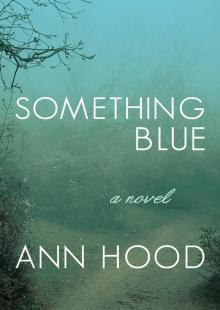 Something Blue
Something Blue Providence Noir
Providence Noir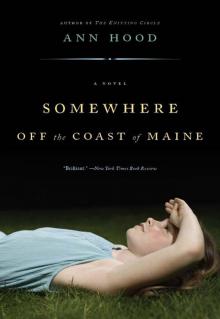 Somewhere Off the Coast of Maine
Somewhere Off the Coast of Maine Jewel of the East
Jewel of the East Queen Liliuokalani: Royal Prisoner
Queen Liliuokalani: Royal Prisoner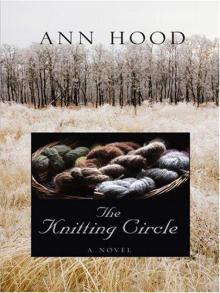 The Knitting Circle
The Knitting Circle Leonardo da Vinci: Renaissance Master
Leonardo da Vinci: Renaissance Master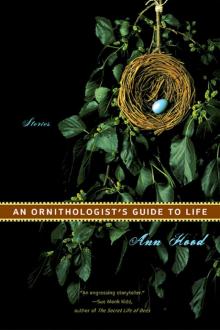 An Ornithologist's Guide to Life
An Ornithologist's Guide to Life The Red Thread
The Red Thread She Loves You (Yeah, Yeah, Yeah)
She Loves You (Yeah, Yeah, Yeah)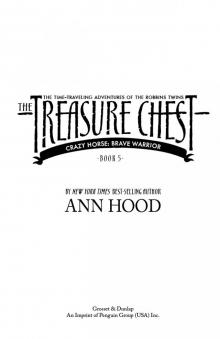 Brave Warrior
Brave Warrior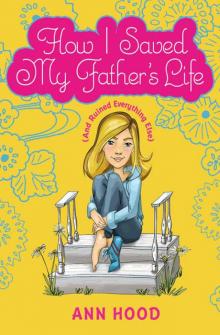 How I Saved My Father's Life (and Ruined Everything Else)
How I Saved My Father's Life (and Ruined Everything Else) An Italian Wife
An Italian Wife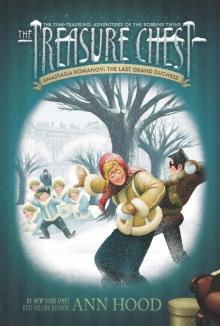 Anastasia Romanov: The Last Grand Duchess #10
Anastasia Romanov: The Last Grand Duchess #10 Prince of Air
Prince of Air Amelia Earhart: Lady Lindy
Amelia Earhart: Lady Lindy Places to Stay the Night
Places to Stay the Night Little Lion
Little Lion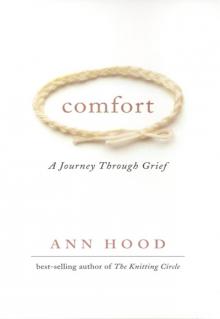 Comfort
Comfort Angel of the Battlefield
Angel of the Battlefield